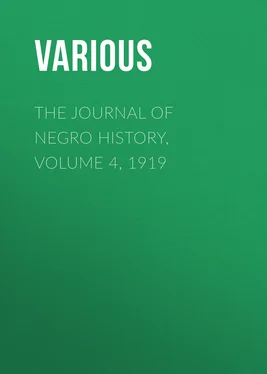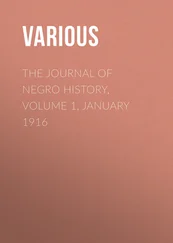Various - The Journal of Negro History, Volume 4, 1919
Здесь есть возможность читать онлайн «Various - The Journal of Negro History, Volume 4, 1919» — ознакомительный отрывок электронной книги совершенно бесплатно, а после прочтения отрывка купить полную версию. В некоторых случаях можно слушать аудио, скачать через торрент в формате fb2 и присутствует краткое содержание. Жанр: foreign_antique, periodic, История, foreign_edu, на английском языке. Описание произведения, (предисловие) а так же отзывы посетителей доступны на портале библиотеки ЛибКат.
- Название:The Journal of Negro History, Volume 4, 1919
- Автор:
- Жанр:
- Год:неизвестен
- ISBN:нет данных
- Рейтинг книги:5 / 5. Голосов: 1
-
Избранное:Добавить в избранное
- Отзывы:
-
Ваша оценка:
- 100
- 1
- 2
- 3
- 4
- 5
The Journal of Negro History, Volume 4, 1919: краткое содержание, описание и аннотация
Предлагаем к чтению аннотацию, описание, краткое содержание или предисловие (зависит от того, что написал сам автор книги «The Journal of Negro History, Volume 4, 1919»). Если вы не нашли необходимую информацию о книге — напишите в комментариях, мы постараемся отыскать её.
The Journal of Negro History, Volume 4, 1919 — читать онлайн ознакомительный отрывок
Ниже представлен текст книги, разбитый по страницам. Система сохранения места последней прочитанной страницы, позволяет с удобством читать онлайн бесплатно книгу «The Journal of Negro History, Volume 4, 1919», без необходимости каждый раз заново искать на чём Вы остановились. Поставьте закладку, и сможете в любой момент перейти на страницу, на которой закончили чтение.
Интервал:
Закладка:
It is the subjective, historic and ultimately, perhaps, racial and temperamental factor in the lives of peoples which makes it difficult, though not impossible, perhaps, to transmit political and religious institutions to people of a different racial type and a different social tradition. William James' essay, "On a Certain Blindness in Human Beings," in which he points out how completely we are likely to miss the point and mistake the inner significance of the lives of those about us, unless we share their expedience, emphasizes this fact. If then the transmission and fusion of cultures is slow, incomplete and sometimes impossible, it is because the external forms, the formulas, technical devices of every social tradition can be more easily transmitted than the aims, the attitudes, sentiments and ideals which attach to them are embodied in them. The former can be copied and used; the latter must be appreciated and understood.
For a study of the acculturation process, there are probably no materials more complete and accessible than those offered by the history of the American Negro. No other representatives of a primitive race have had so prolonged and so intimate an association with European civilization, and still preserved their racial identity. Among no other people is it possible to find so many stages of culture existing contemporaneously. It has been generally taken for granted that the Negro brought a considerable fund of African tradition and African superstition from Africa to America. One not infrequently finds in the current literature and even in standard books upon the Negro, references to voodoo practices among the Negroes in the Southern States. As a matter-of-fact the last authentic account which we have of anything approaching a Negro nature worship in the United States took place in Louisiana in 1884. It is described by George W. Cable in an article on "Creole Slave Songs" which appeared in the Century Magazine in 1886. In this case it seems to have been an importation from the West Indies. I have never found an account of a genuine instance of voodoo worship elsewhere in the United States, although it seems to have been common enough in the West Indies at one time.
My own impression is that the amount of African tradition which the Negro brought to the United States was very small. In fact, there is every reason to believe, it seems to me, that the Negro, when he landed in the United States, left behind him almost everything but his dark complexion and his tropical temperament. It is very difficult to find in the South today anything that can be traced directly back to Africa. This does not mean that there is not a great deal of superstition, conjuring, "root doctoring" and magic generally among the Negroes of the United States. What it does mean is that the superstitions we do find are those which we might expect to grow up anywhere among an imaginative people, living in an intellectual twilight such as exists on the isolated plantations of the Southern States. Furthermore, this superstition is in no way associated, as it is in some of the countries of Europe, southern Italy for example, with religious beliefs and practices. It is not part of Negro Christianity. It is with him, as it is with us, folk-lore pure and simple. It is said that there are but two African words that have been retained in the English language. One of these is the word Buckra, from which comes Buckra Beach in Virginia. This seems remarkable when we consider that slaves were still brought into the United States clandestinely up to 1862. 83 83 There is or was a few years ago near Mobile a colony of Africans who were brought to the United States as late as 1860. It is true, also, that Major R. R. Moton, who has succeeded Booker T. Washington as head of Tuskegee Institute, still preserves the story that was told him by his grandmother of the way in which his great-grandfather was brought from Africa in a slave ship.
The explanation is to be found in the manner in which the Negro slaves were collected in Africa and the manner in which they were disposed of after they arrived in this country. The great markets for slaves in Africa were on the West Coast, but the old slave trails ran back from the coast far into the interior of the continent, and all the peoples of Central Africa contributed to the stream of enforced emigration to the New World. In the West Indies a good deal was known among slave-traders and plantation owners about the character and relative value of slaves from different parts of Africa, but in the United States there was less knowledge and less discrimination. Coming from all parts of Africa and having no common language and common tradition, the memories of Africa which they brought with them were soon lost.
There was less opportunity in the United States also than in the West Indies for a slave to meet one of his own people, because the plantations were considerably smaller, more widely scattered and, especially, because as soon as they were landed in this country, slaves were immediately divided and shipped in small numbers, frequently no more than one or two at a time, to different plantations. This was the procedure with the very first Negroes brought to this country. It was found easier to deal with the slaves, if they were separated from their kinsmen.
On the plantation they were thrown together with slaves who had already forgotten or only dimly remembered their life in Africa. English was the only language of the plantation. The attitude of the slave plantation to each fresh arrival seems to have been much like that of the older immigrant towards the greenhorn. Everything that marked him as an alien was regarded as ridiculous and barbaric. 84 84 Domestic Manners and Social Condition of the White, Coloured and Negro Population of the West Indies , by Mrs. Carmichael, Vol. I. (London, Wittaker, Treacher and Co.), p. 251. "Native Africans do not at all like it to be supposed that they retain the customs of their country and consider themselves wonderfully civilized by being transplanted from Africa to the West Indies. Creole Negroes invariably consider themselves superior people, and lord it over the native Africans."
Furthermore, the slave had in fact very little desire to return to his native land. I once had an opportunity to talk with an old man living just outside of Mobile, who was a member of what was known as the African colony. This African colony represented the cargo of one of the last slave ships successful in landing in this country just at the opening of the war. The old man remembered Africa and gave me a very interesting account of the way in which he was captured and brought to America. I asked him if he had ever wished to return. He said that a missionary who had been in their country and spoke their language had visited them at one time. This missionary offered to send them back to Africa and even urged them to go. "I told him," said the old man, "I crossed the ocean once, but I made up my mind then never to trust myself in a boat with a white man again."
The fact that the Negro brought with him from Africa so little tradition which he was able to transmit and perpetuate on American soil, makes that race unique among all peoples of our cosmopolitan population. Other peoples have lost, under the disintegrating influence of the American environment, much of their cultural heritage. None have been so utterly cut off and estranged from their ancestral land, traditions and people. It is just because of this that the history of the Negro offers exceptional materials for determining the relative influence of temperamental and historical conditions upon the process by which cultural materials from one racial group are transmitted to another; for, in spite of the fact that the Negro brought so little intellectual baggage with him, he has exhibited a rather marked ethnical individuality in the use and interpretation of the cultural materials to which he has had access.
Читать дальшеИнтервал:
Закладка:
Похожие книги на «The Journal of Negro History, Volume 4, 1919»
Представляем Вашему вниманию похожие книги на «The Journal of Negro History, Volume 4, 1919» списком для выбора. Мы отобрали схожую по названию и смыслу литературу в надежде предоставить читателям больше вариантов отыскать новые, интересные, ещё непрочитанные произведения.
Обсуждение, отзывы о книге «The Journal of Negro History, Volume 4, 1919» и просто собственные мнения читателей. Оставьте ваши комментарии, напишите, что Вы думаете о произведении, его смысле или главных героях. Укажите что конкретно понравилось, а что нет, и почему Вы так считаете.












